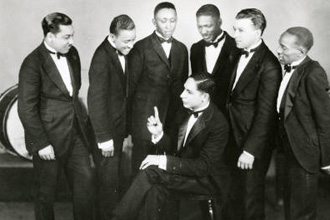'Silences of history' impact perceptions of early jazz

Some music by the famous jazz pianist Jelly Roll Morton, seated here with his band, the Red Hot Peppers, in 1926, was bawdy and subject to censorship, said lecturer Elijah Wald on Wednesday (March 20). (Photo from the Hogan Jazz Archive)
Wald, also a musician, said that there are many cases like “Winin' Boy,” and asked, “How much history gets ignored because of the censorship of these songs?”
Oral culture is “trusted to outsiders,” he said for example, when a white American writes about the history of black American blues in the Mississippi Delta, the account inevitably is selective documentation. This creates “silences of history,” in which certain topics are left out because they did not appeal to the person writing the history.
He said that sexual topics were often censored or left out by historians due to perceived inappropriate connotations.
New Orleans jazz is subject to this idea, Wald said, because white dancers and record collectors in New York brought that genre from its roots in African American communities into popular culture, creating its story through their own context.
“History is not static the past keeps changing, so it is always worth going back over an old trail,” Wald concluded.
His lecture at the Freeman Auditorium in the Woldenberg Art Center was titled, “The Singers of Tail: Jelly Roll Morton, the Blues and the Silences of History.” It was sponsored by the New Orleans Center for the Gulf South at Tulane.
Hannah Dean is a first-year Newcomb-Tulane College student.
